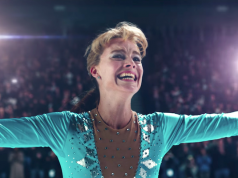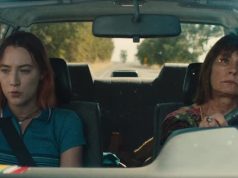Rebecca Wells’ novel “Divine Secrets of the Ya-Ya Sisterhood” is about two things. One is the sublime nature of life-long friendships. The other is how the gaps between us and our parents may be bridged by understanding where they came from.
Neither of these themes is examined with much enthusiasm in the film version. One is tempted to hypothesize that Callie Khouri didn’t realize they WERE the themes when she wrote the screenplay and directed the film.
Having read the book, it’s difficult for me to tell how the movie stands on its own without comparing it to its source. It is entertaining, for the most part, and the acting is generally good (we will discuss that later). It is not very touching nor insightful, though; audiences unfamiliar with the novel may view it as just a “chick flick” with a bit of Southern sass added.
It begins with Siddalee Walker (Sandra Bullock), a successful Broadway playwright, giving an interview to Time magazine in which she paints her mother, Vivi (Ellen Burstyn), as an abusive tyrant. Vivi, given to melodrama and histrionics, cuts Siddalee out of her life.
Sent to repair the damage, though, are Vivi’s friends, Teensy (Fionnula Flanagan), Necie (Shirley Knight) and Caro (Maggie Smith). The four Louisiana belles have been close-knit since childhood, calling themselves the Ya-Yas. They are closer to each other than they ever were to their respective husbands, and now they have grown old together, drinking and laughing their way through life. (Nearly every scene has a Bloody Mary in it somewhere; one of the Ya-Yas says, on the way to Vivi’s house, “I hope this isn’t a real emergency, because I only brought one bottle of vodka.”)
The three Ya-Yas abduct Siddalee — who might as well be their own daughter, for as close as they are to her mother — and take her back to Louisiana, where they set out to explain why Vivi is the way she is — the heartbreaks and trials that shaped her into the vivacious, larger-than-life figure she is now.
This entails a lot of flashbacks to the time of the Ya-Yas’ youth and young adulthood. The first hour of the film resembles a flashback episode of a sitcom, where the dialogue exists only to lead us to the next clip, often at the expense of smoothness or believability.
In the book, these flashbacks help paint the overall picture of Vivi. We see her stormy relationship with her religious-zealot mother, Buggy (Cherry Jones) We see her romance with Teensy’s brother. We see it all.
In the film, the decision of which incidents to omit and which to include is puzzling. The ones that made the cut are without context, and one is at a loss to determine what, if anything, they’re supposed to tell us. For example, we see the Ya-Yas going to Atlanta to the “Gone with the Wind” premiere in 1939, and a subsequent run-in with a racist relative. But so what? Omitted is the amazing sequence where Buggy sends Vivi to a strict Catholic school and Teensy’s mom rescues her — a far more instructive event in terms of depicting how Vivi’s bad mother caused her to become one, too.
Frequently, we are tossed into an emotionally climactic moment without being given the necessary framework, and the feeling is like that of attending the funeral for someone you didn’t know: Obviously, this is a big deal, but darned if I can feel any of it.
Take Siddalee’s memory of her childhood birthdays, when her mother (the younger Vivi is played by Ashley Judd) and siblings would creep into her room early in the morning, sing “Happy Birthday,” and present a cake. Then Vivi would say, “I’m so glad I had you.” In the book, this scenario is painted beautifully, and the line means something. In the film, we are given five seconds of set-up, and the line sounds trite and awkward. Context, people, context.
Ellen Burstyn is fantastic as the modern-day Vivi, anxious about her appearance and reputation. In one of the best supporting roles of the year is James Garner as her much-ignored (but still loving) husband Shep. I would like to see an entire movie about Vivi and Shep.
The rest of the Ya-Yas are great, too, led by the incomparable Maggie Smith, whose Southern accent is not perfect but good enough.
Ashley Judd is the weak link, as she is wont to be. As the young parent version of Vivi, she is too being the Glamorous Ashley Judd to be what she’s really supposed to be: a troubled woman on the verge of a nervous breakdown. In the pivotal flashback where Sidda recalls one of the kindest things her mother ever did for her, Judd doesn’t connect at all. It’s a wasted sequence.
The friendship among the Ya-Yas is hinted at, but not fully realized. The same goes for the enigmatic figure of Vivi, since half of her life is played without distinction by Judd. There are fine moments and fine performances here and there — enough to make it a decent movie, but a terrible adaptation.
C+ (; )





